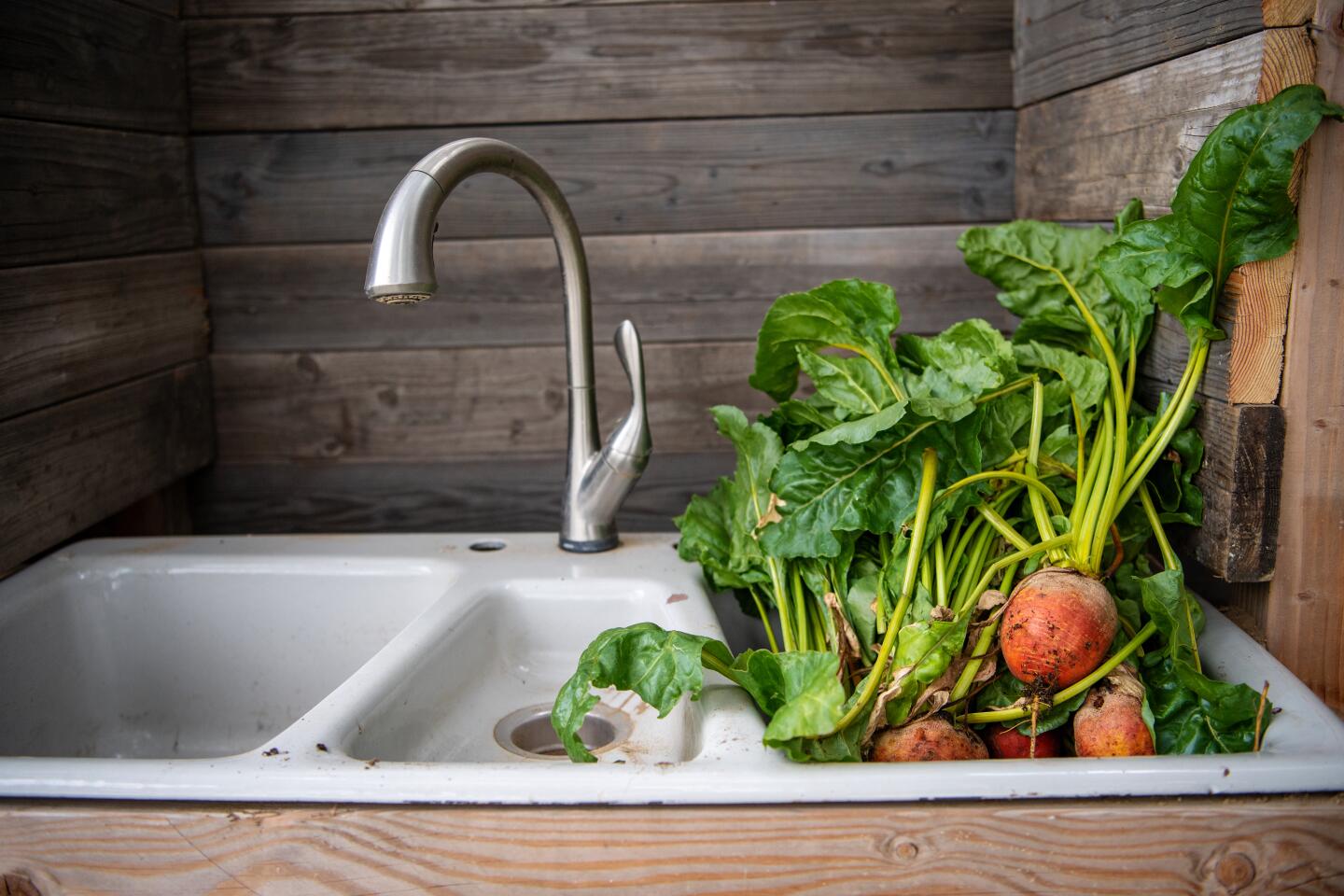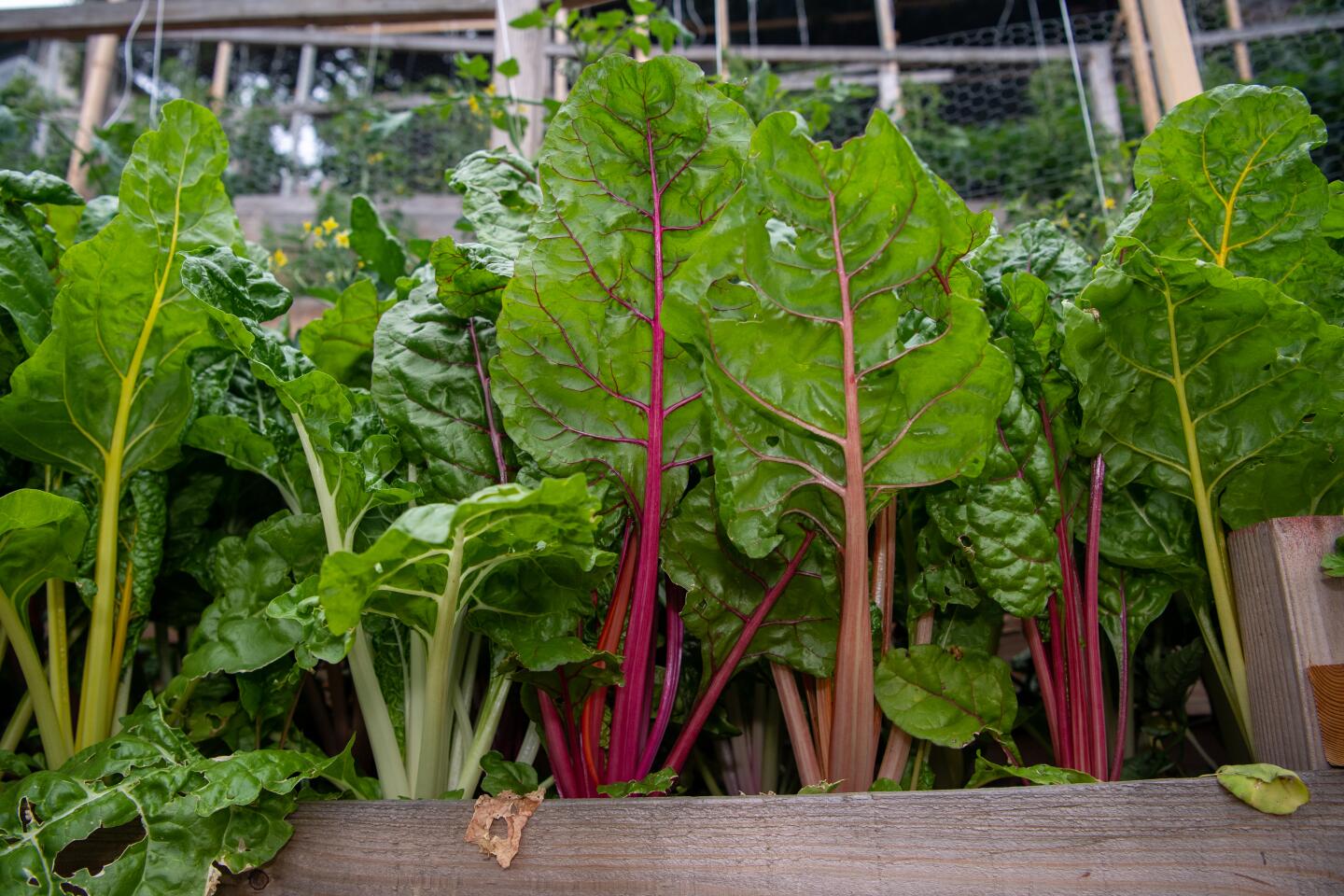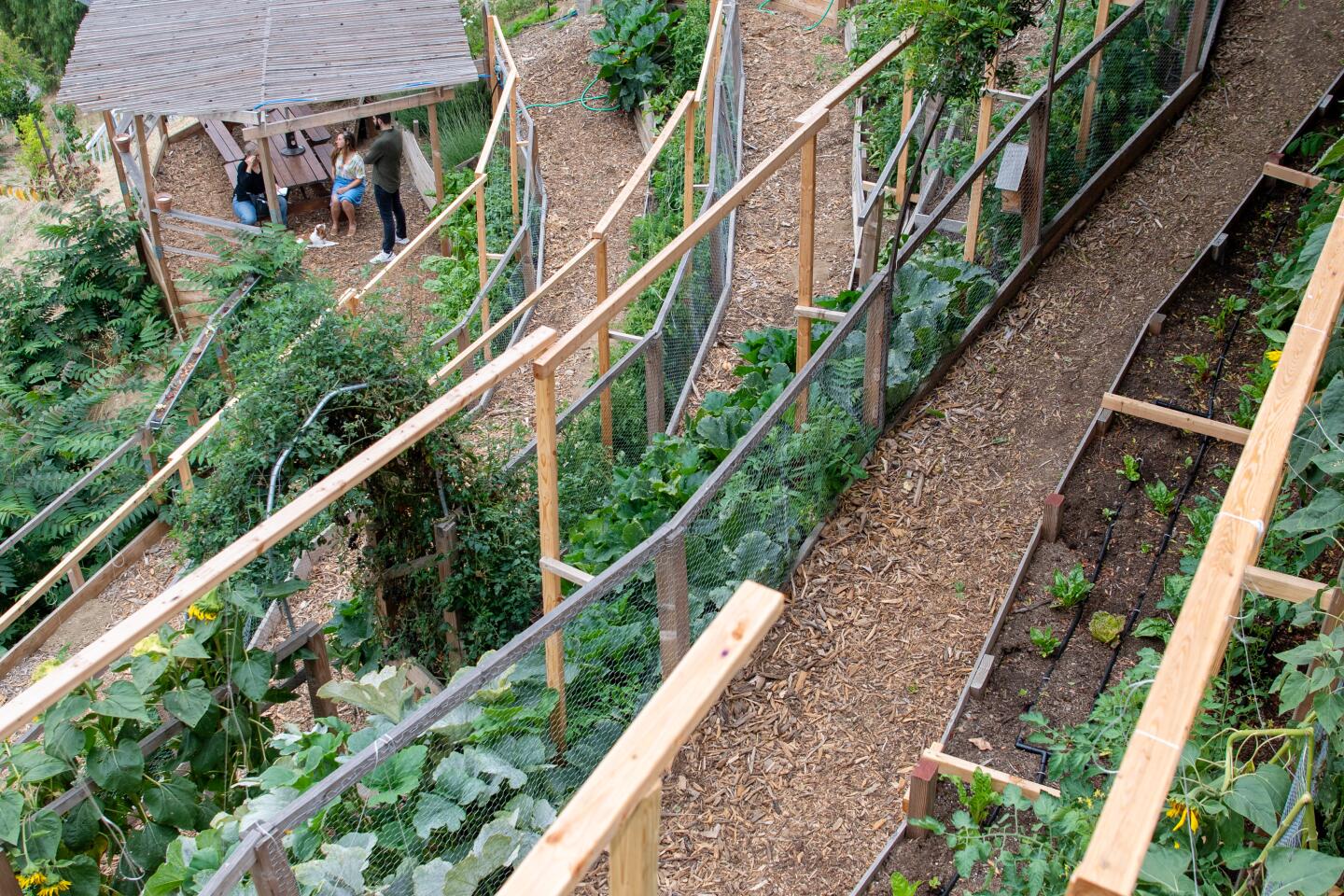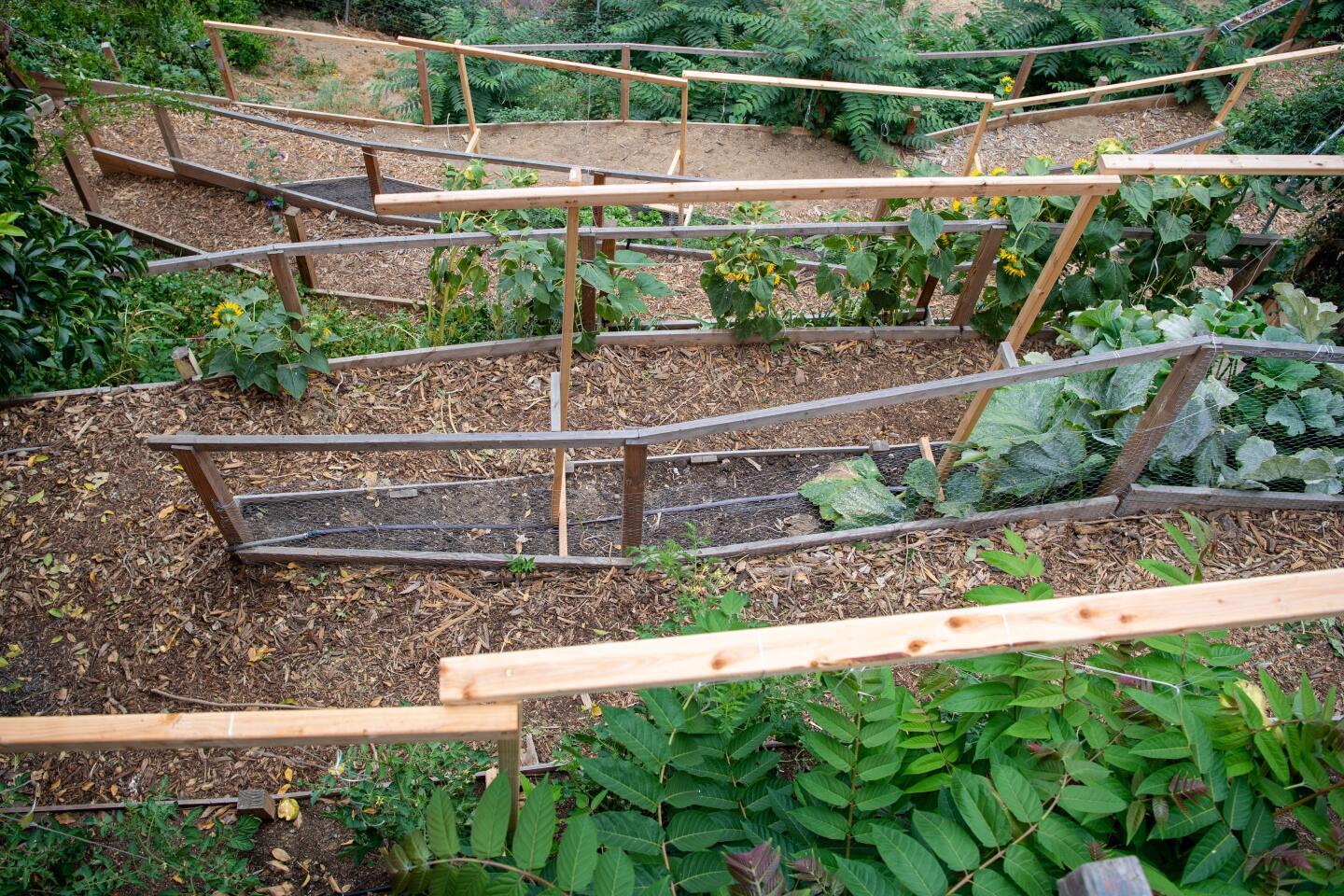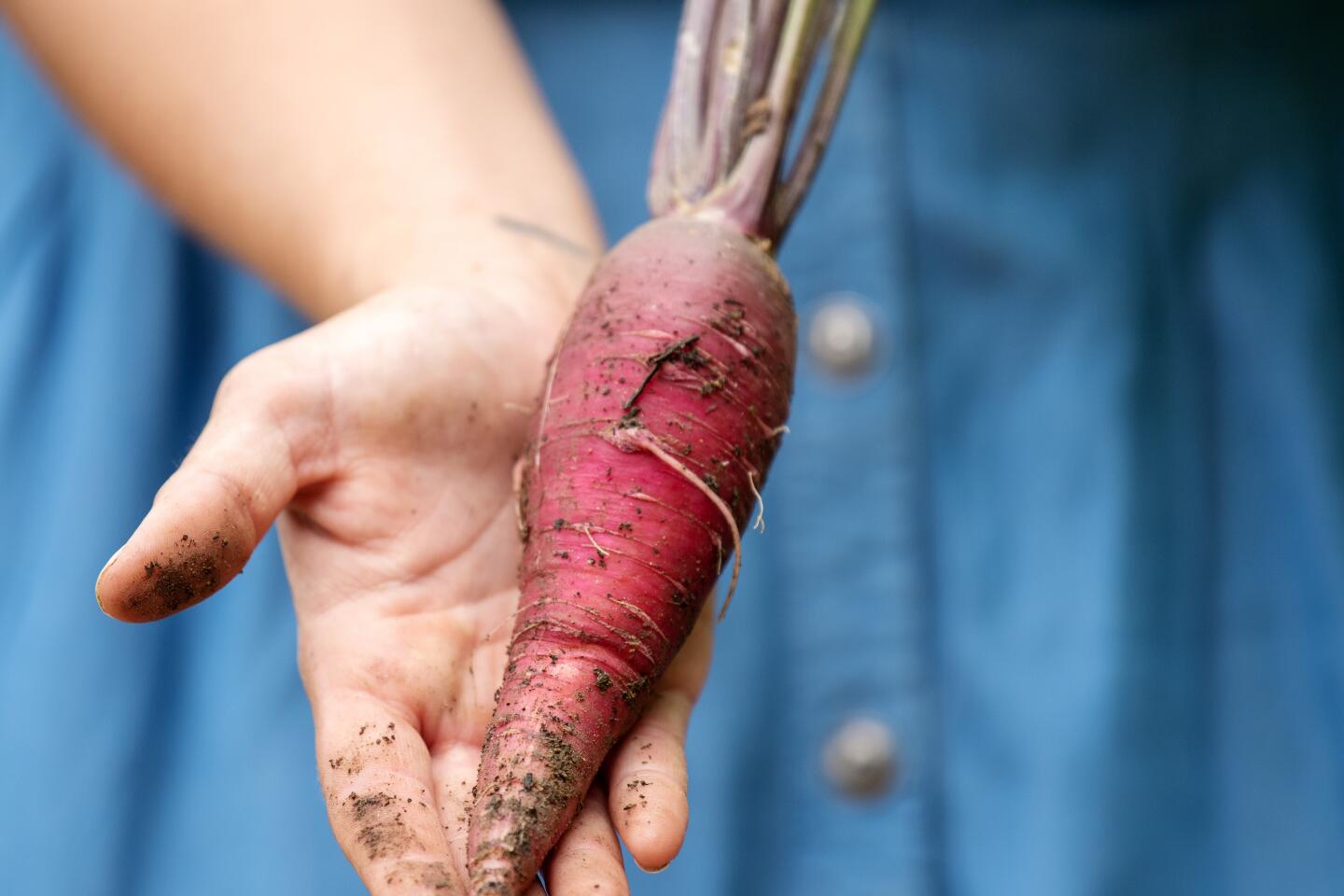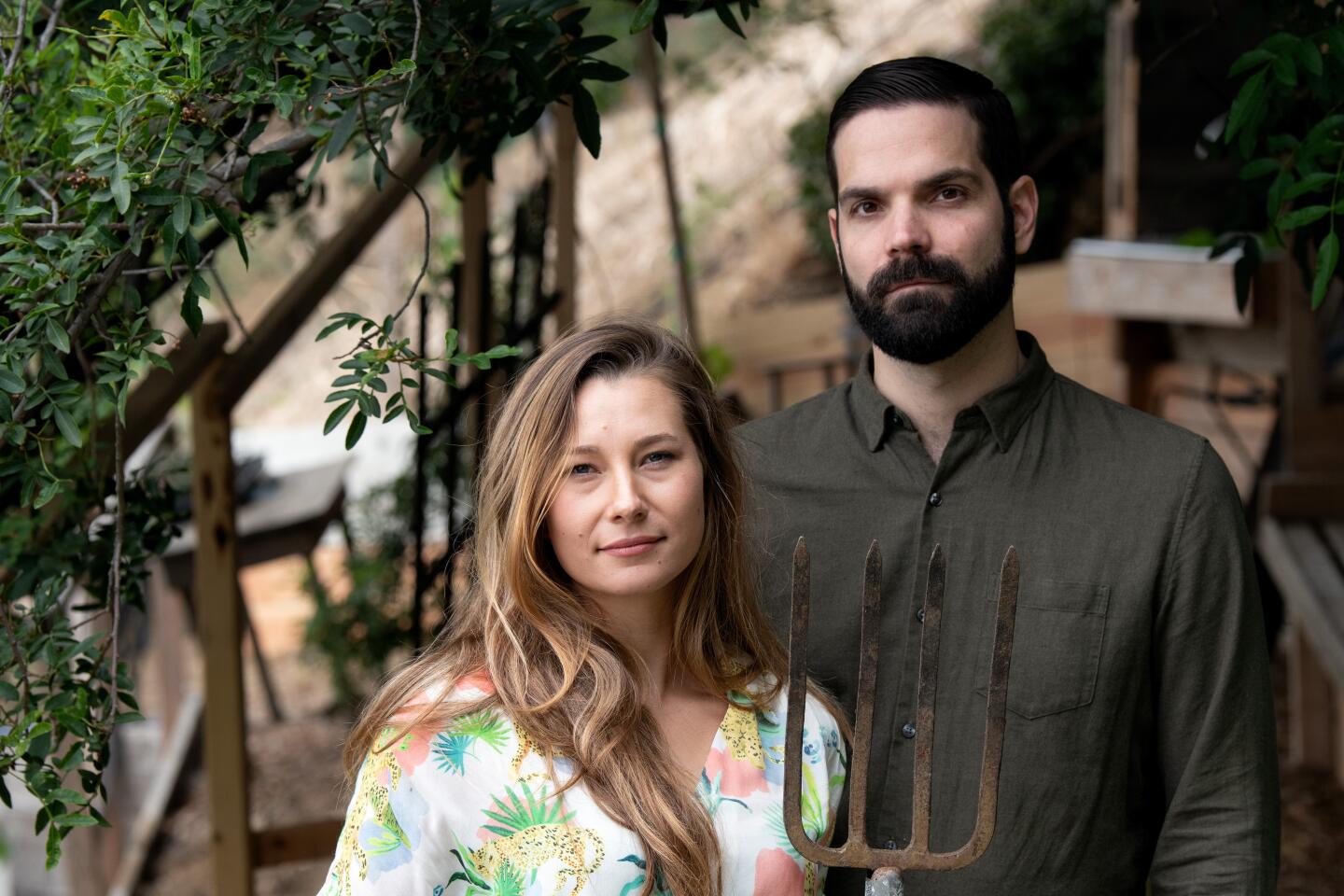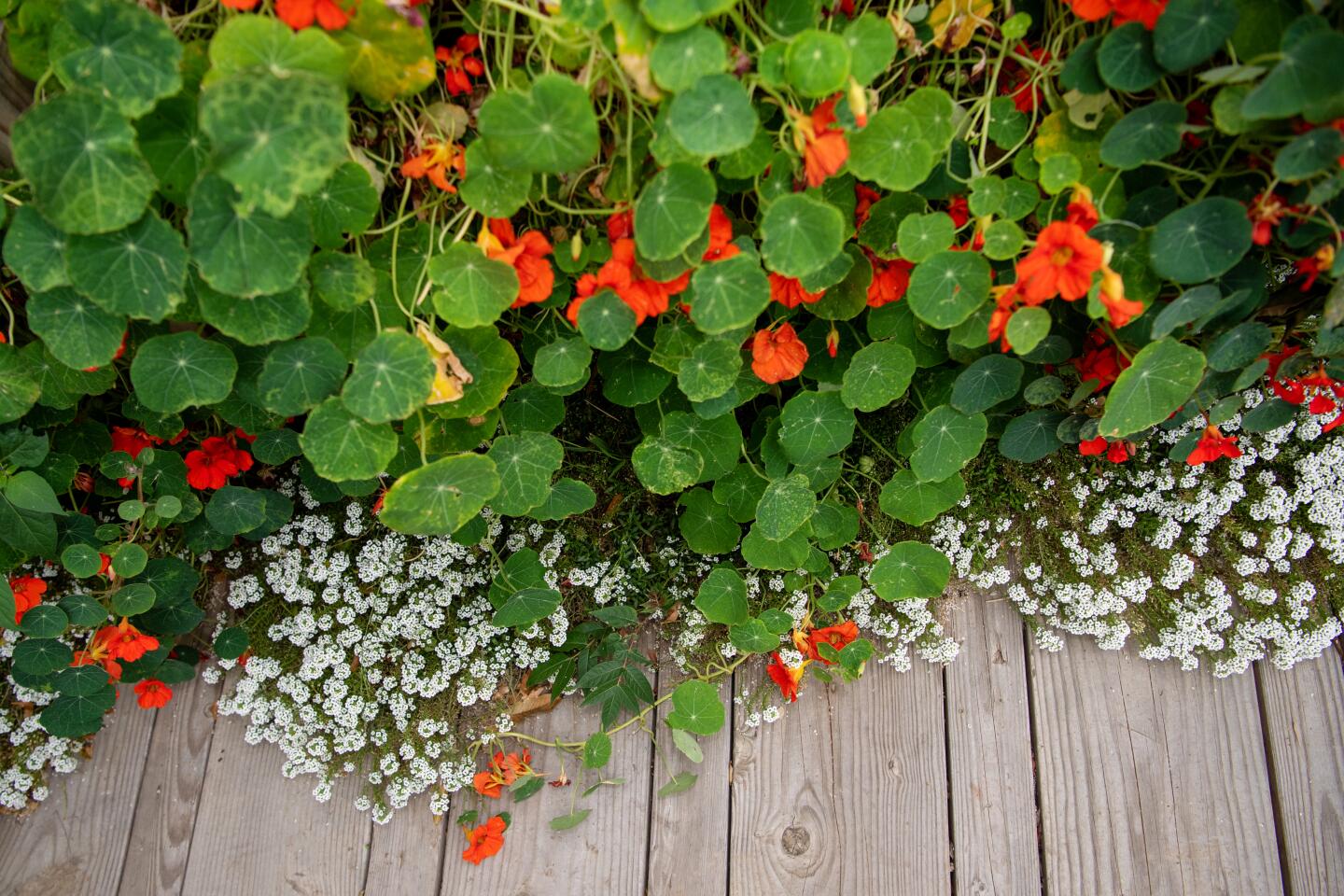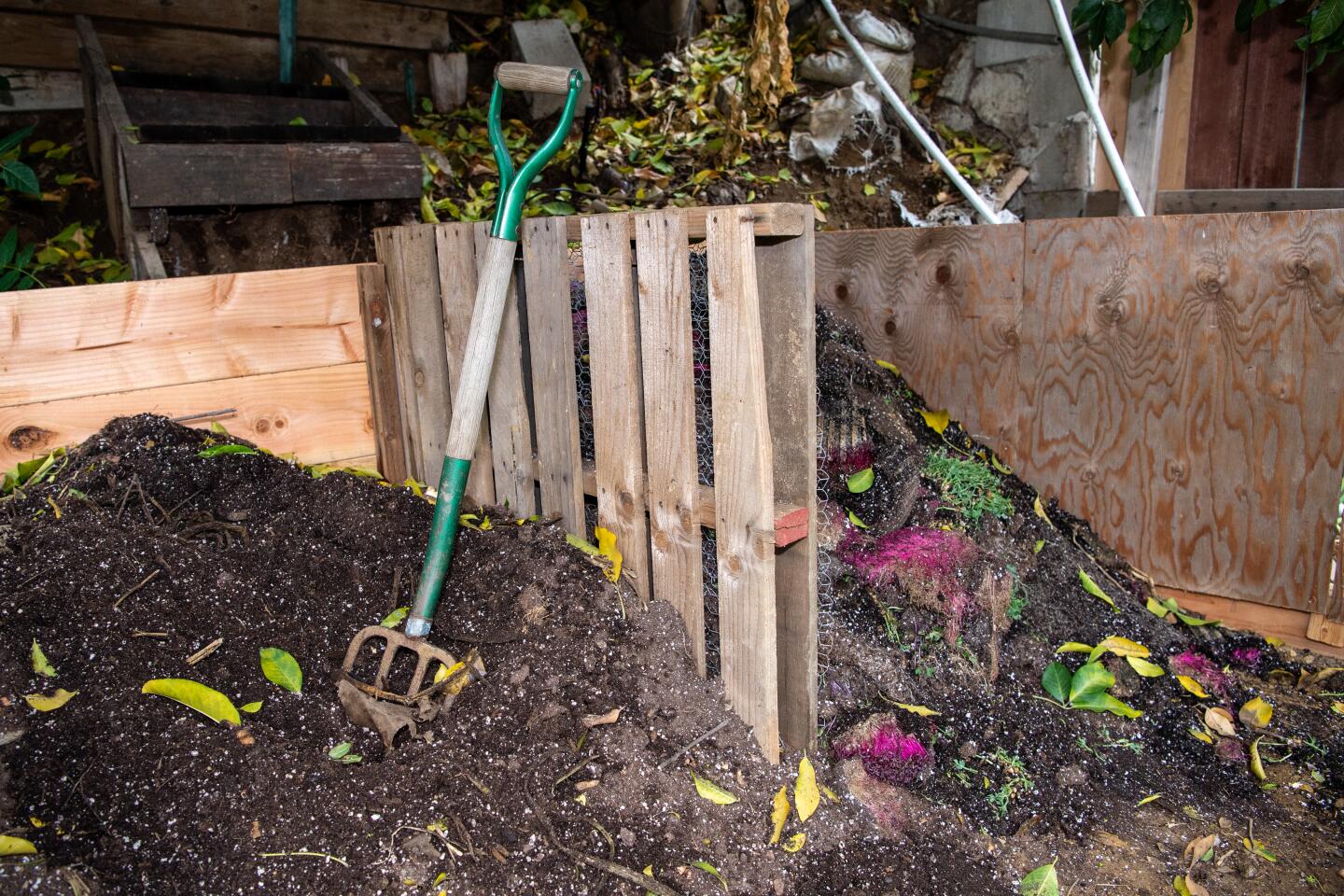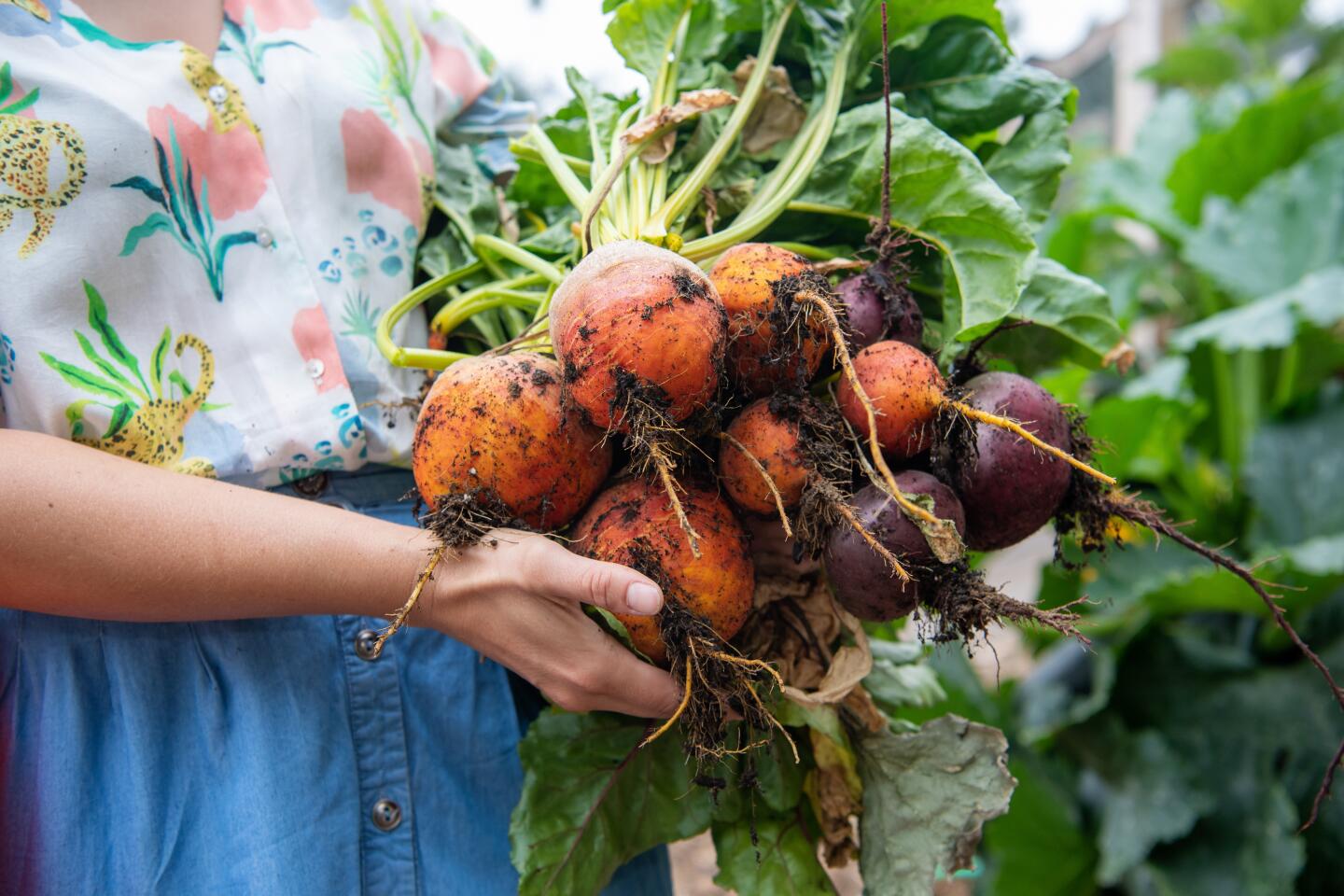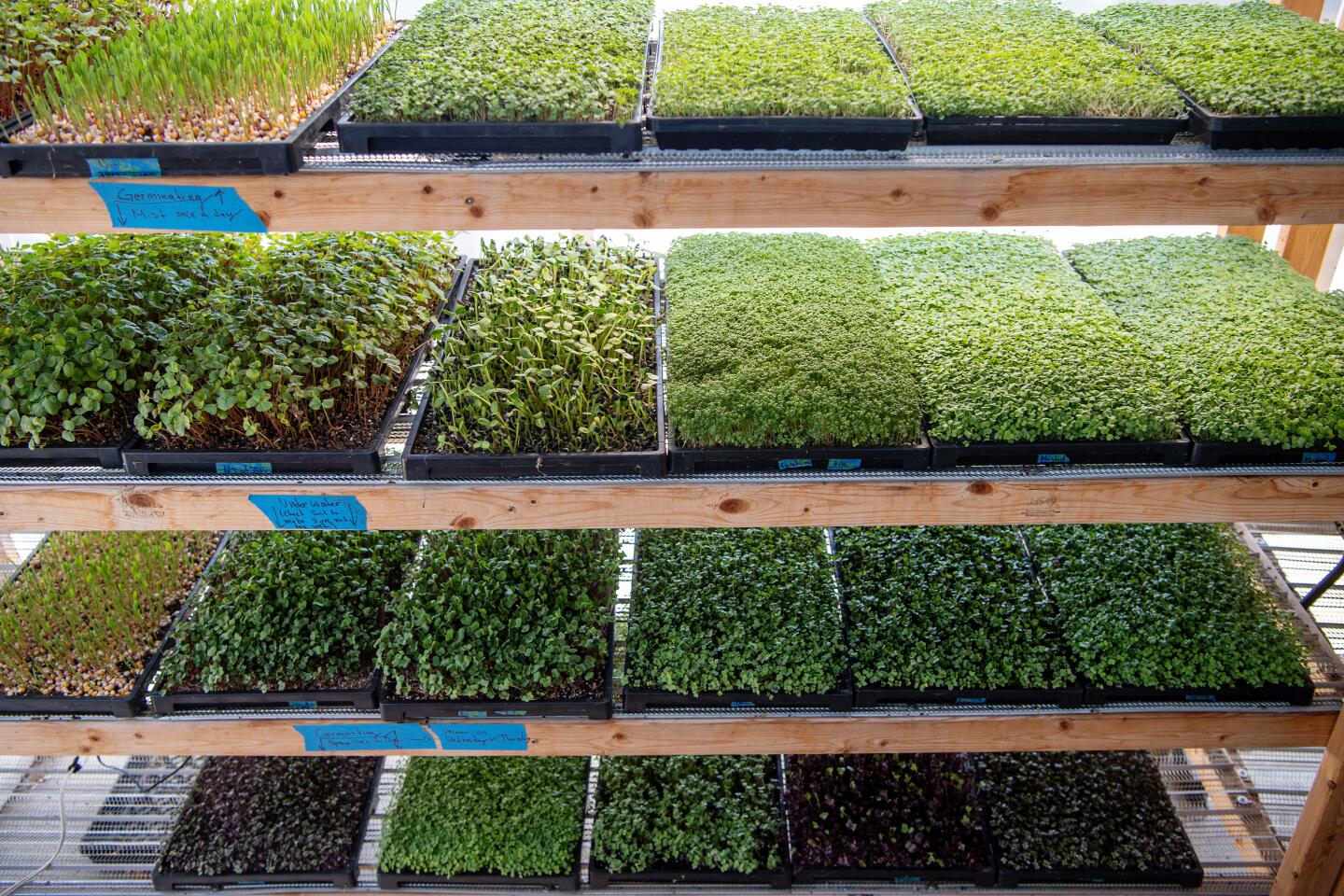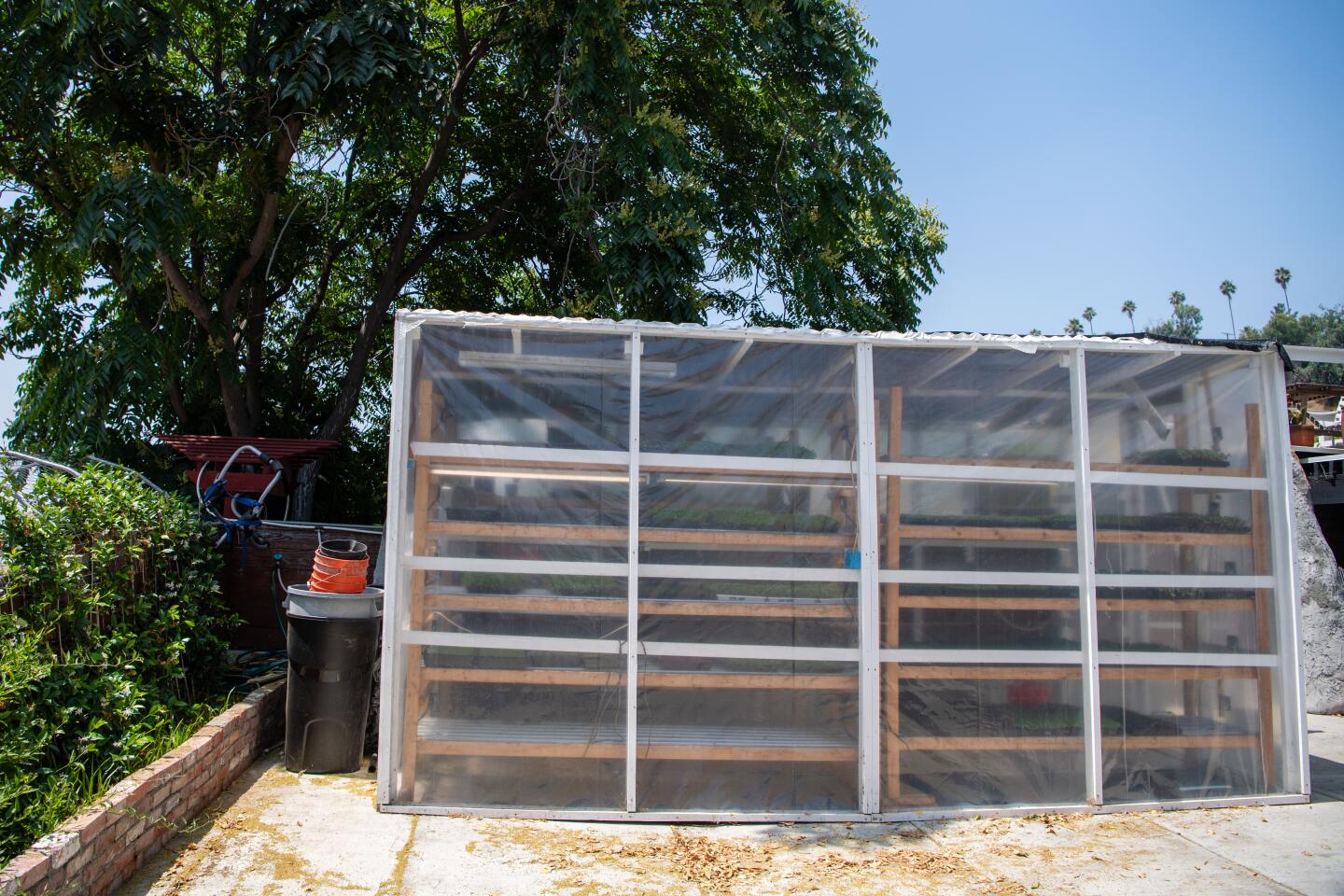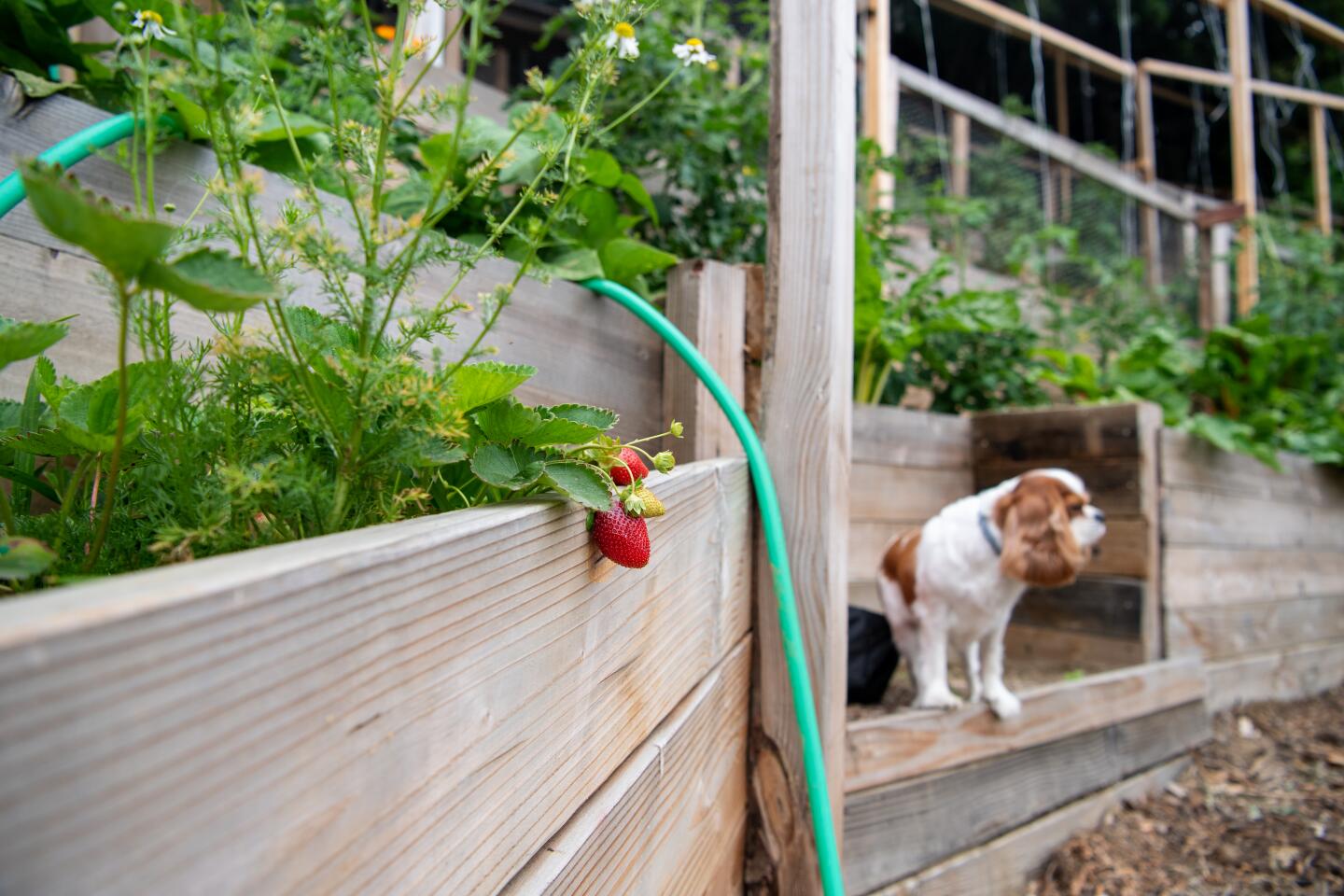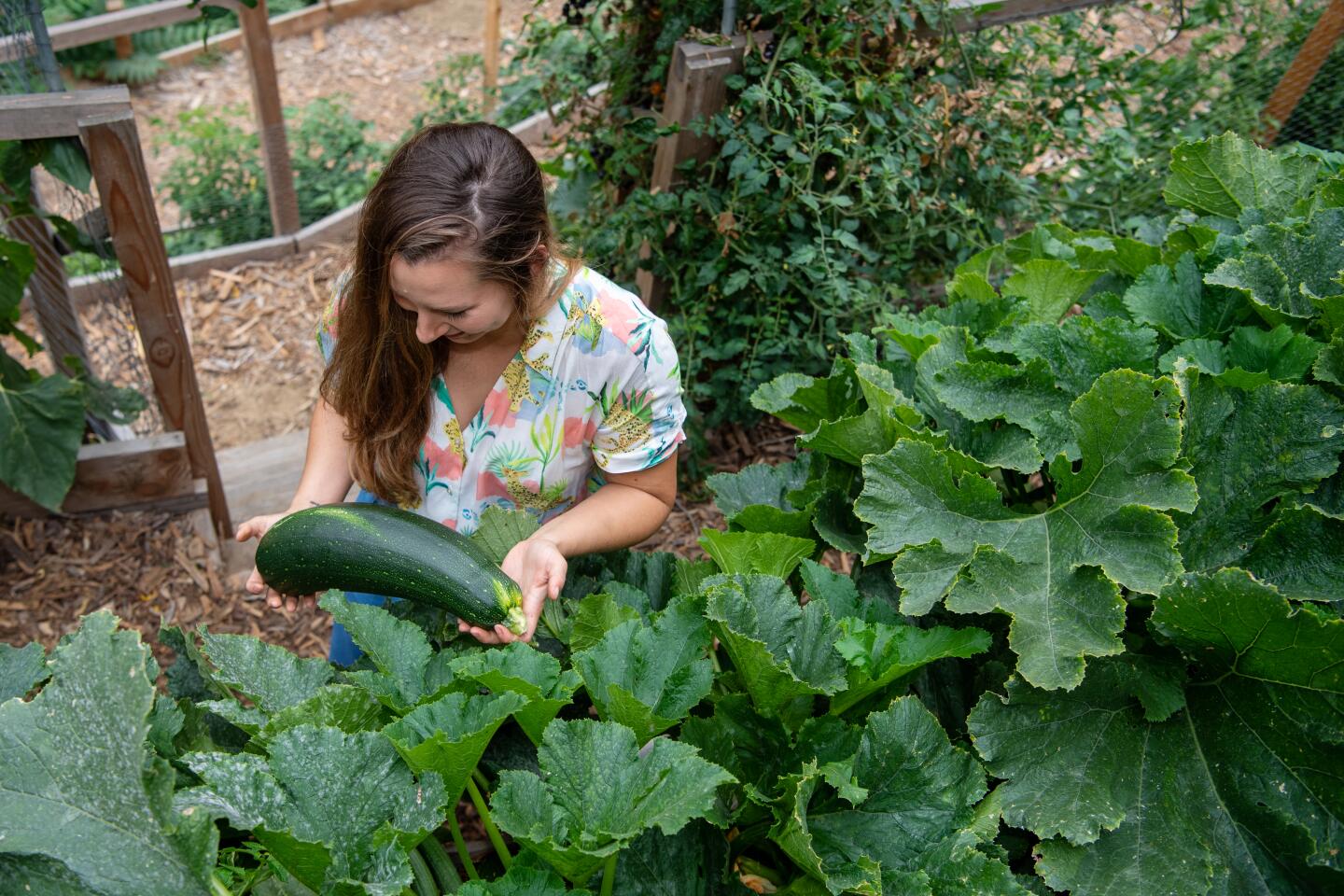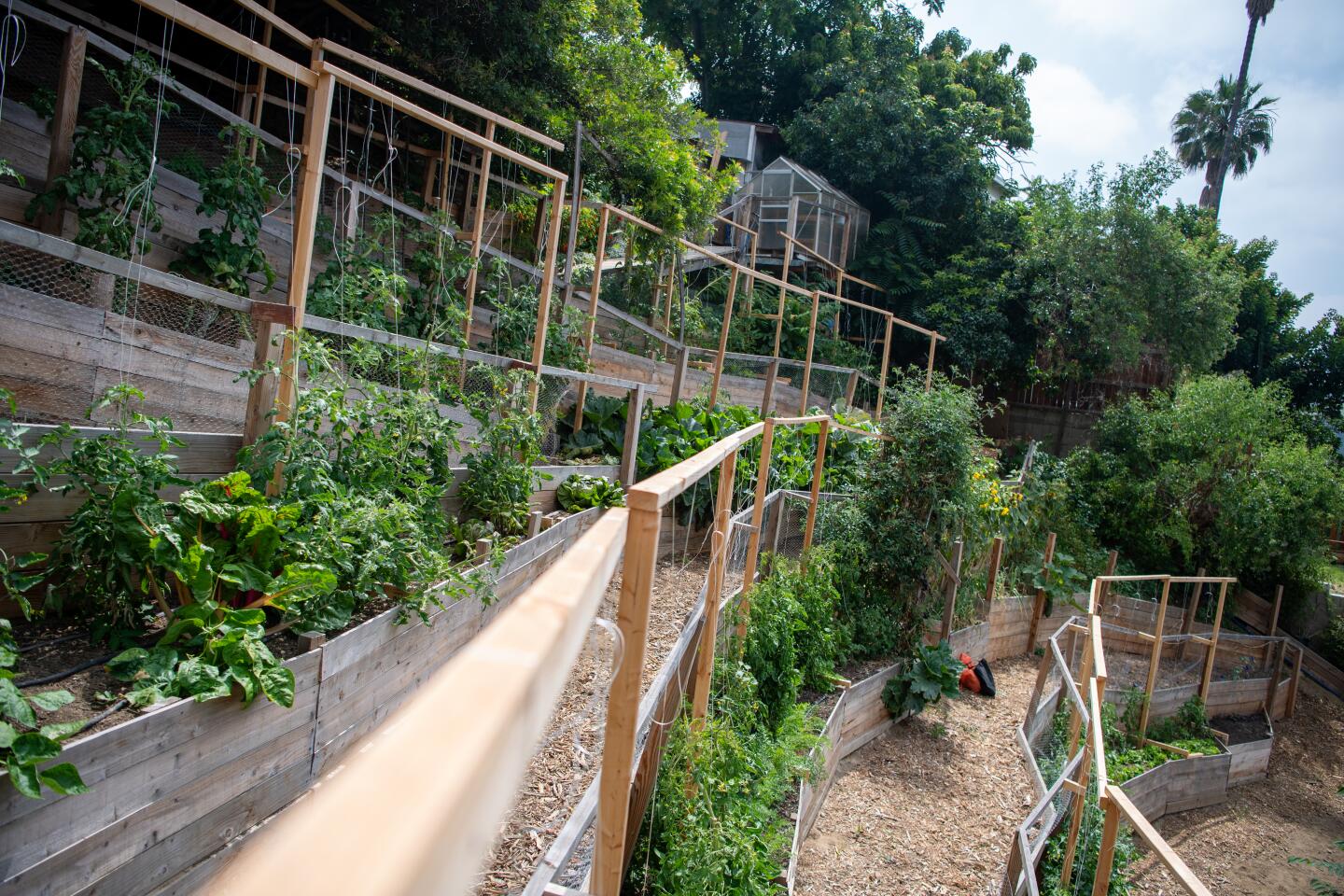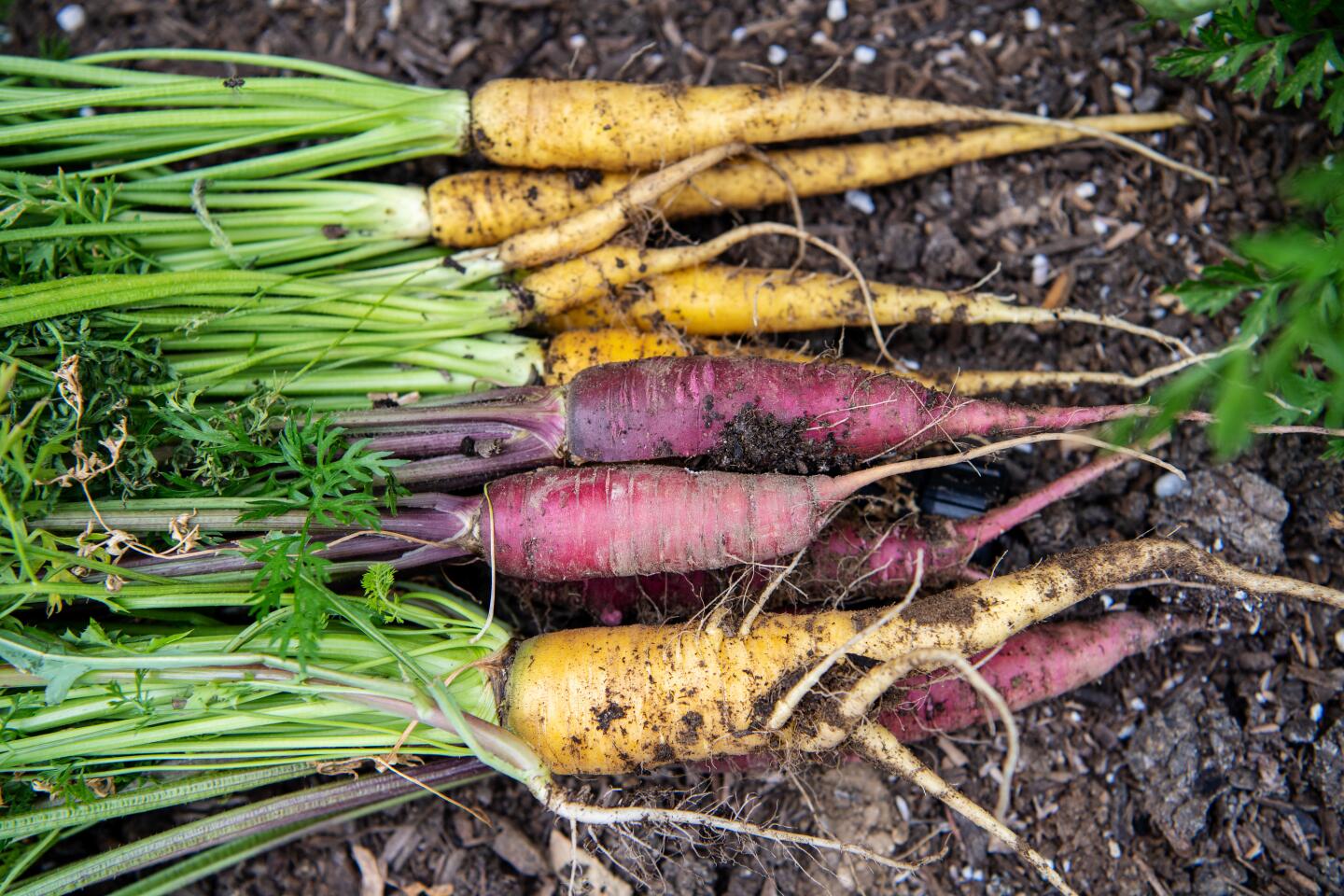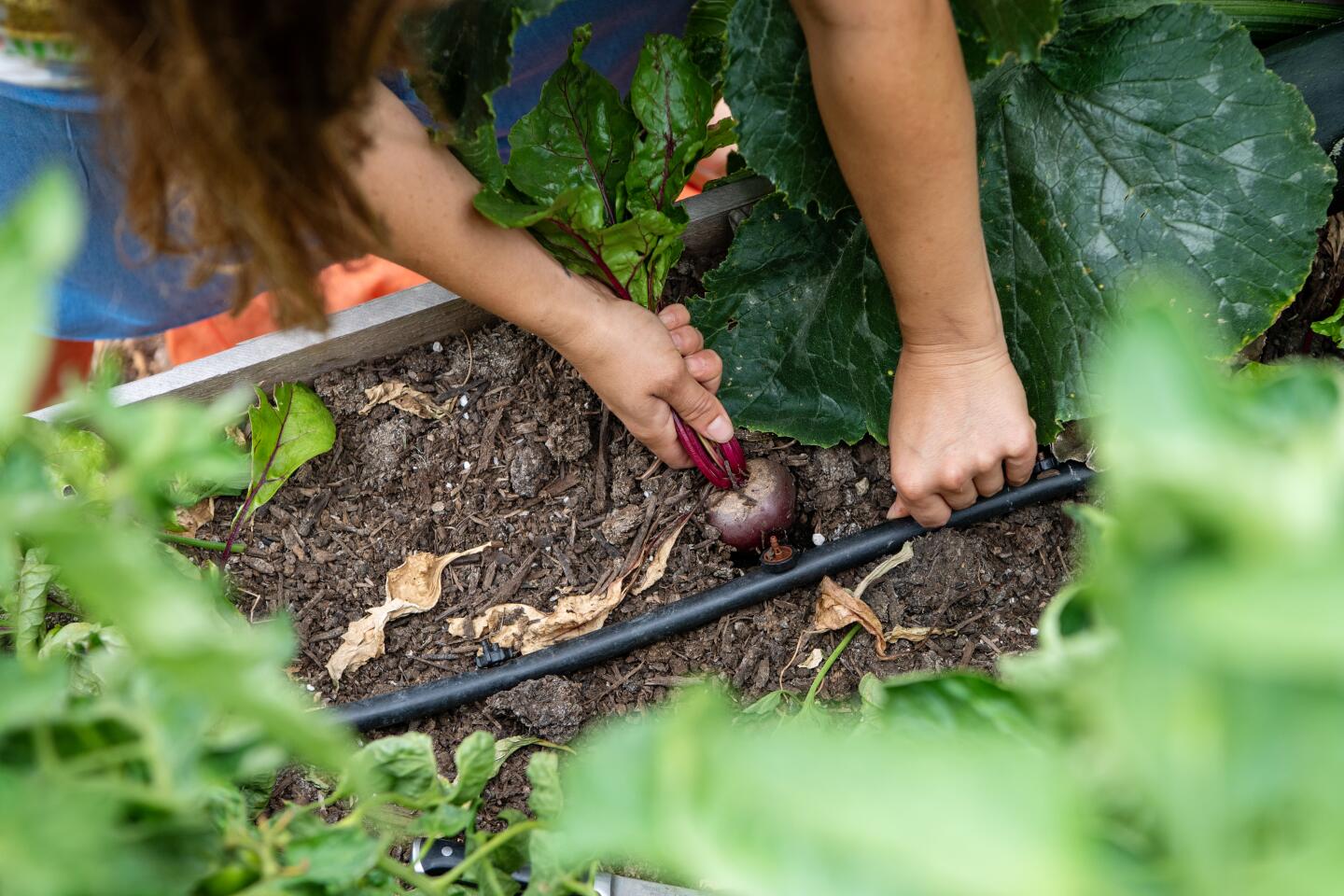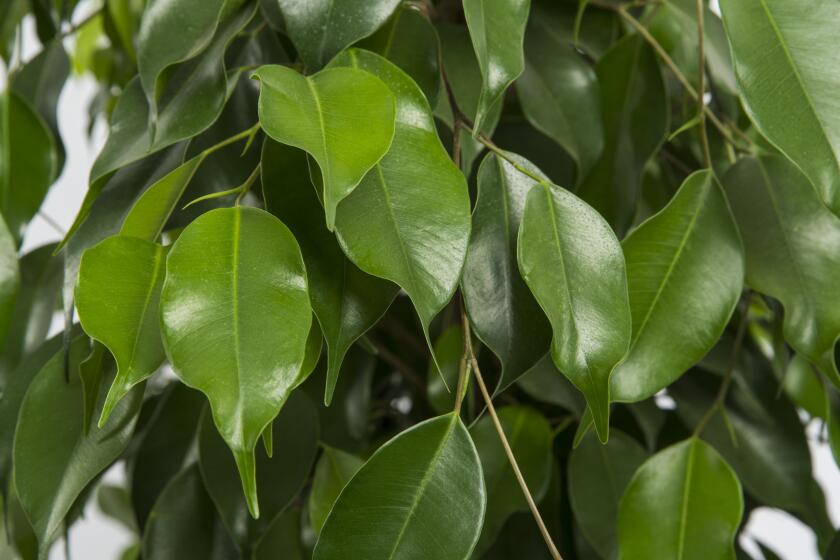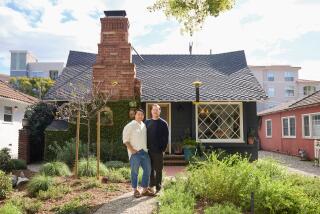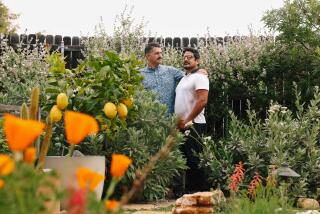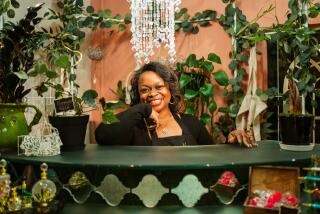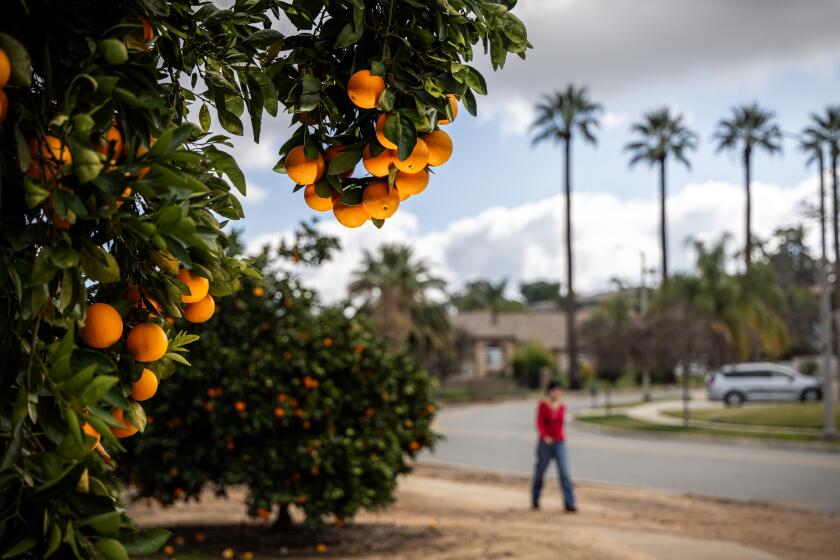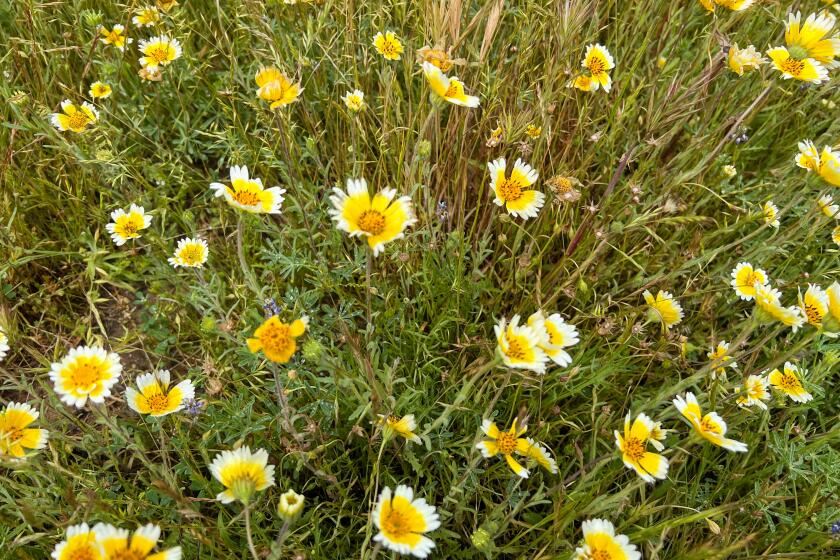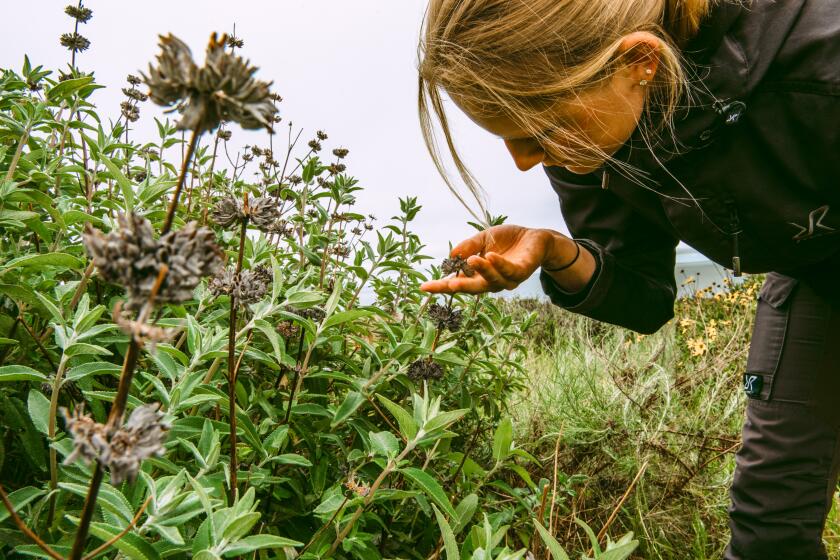In Montecito Heights, a trash-filled hillside is transformed into a thriving urban farm
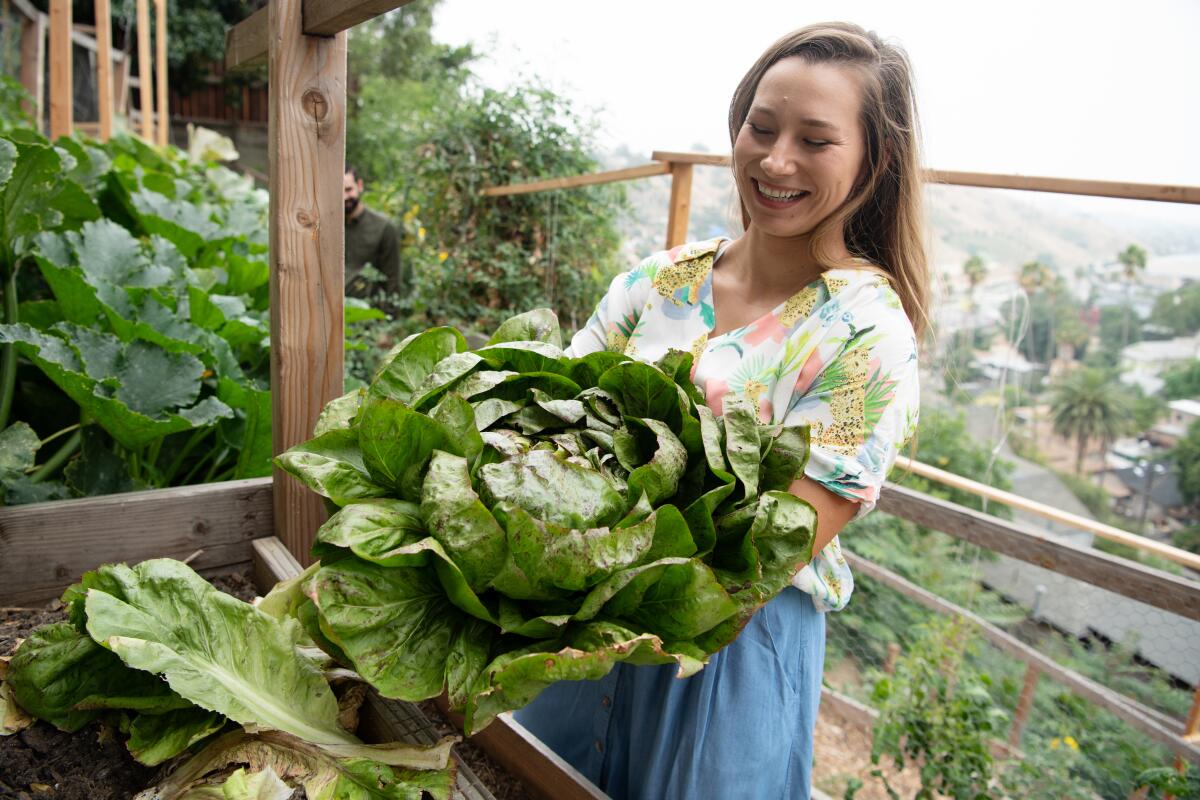
Two years ago, when she was working as a production assistant on a television drama, Joanna Bassi had an epiphany.
“I realized that I had to find something else to do,” Bassi said. “The industry wasn’t for me. I wasn’t using my creativity. I wanted to make money, but everyone on the set was unhappy. That wasn’t how I wanted my life to go.”
She quit her job and made a list of all the things she wanted to do.
As a child growing up in Sherman Oaks, she would often switch bedrooms with the hope that the change of scenery would elevate her outlook on life.
It was a form of wanderlust that would continue into her 20s.
“I transferred colleges three times,” Bassi said. “I moved to Oakland, Rhode Island and Kansas City.”
But it wasn’t until she transformed her trash-strewn hillside into a thriving micro farm that Bassi discovered her true self. “I never found what I was looking for when I changed cities,” she said. “But I found it here on this hillside. I now have a deep understanding of the environment. It’s a good thing to be still.”
On a hot, bright afternoon recently, Bassi walked down one of the five switchbacks she dug, past raised beds filled with tomatoes, beets and Swiss chard, and stopped to inspect an abundant crop of zucchini. “I’m not planting squash again,” she said while harvesting the overgrown vegetables. “They grow too fast. I don’t enjoy them enough, so I neglect them.”
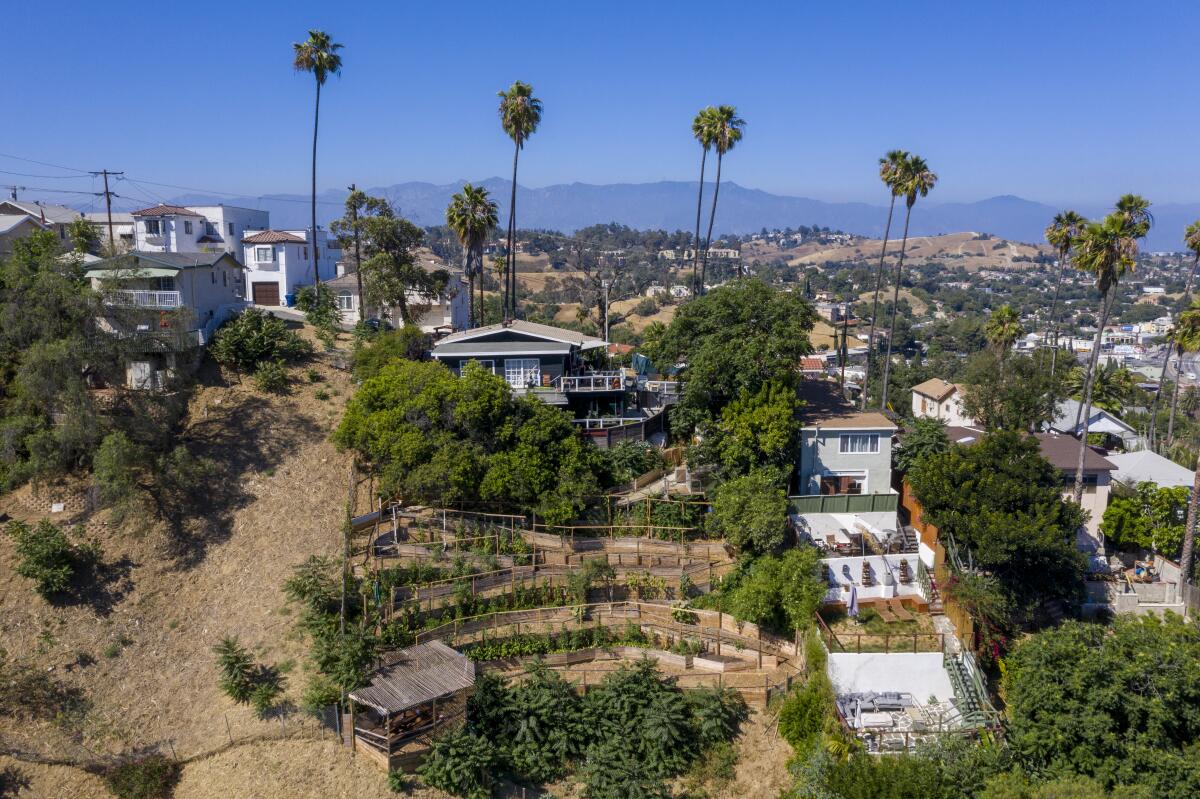
While many millennials are obsessed with indoor plants, Bassi, 30, is following in the path of other, agrarian-minded peers by embracing urban farming just steps from her home and minutes from downtown Los Angeles.
She purchased the 660-square-foot bungalow in 2017 with help from her family, credit cards, and the income from a rental unit on the property. The house was billed as a “hip Craftsman home with sweeping views,” but Bassi, an artist, was drawn to its fanciful “Wes Anderson vibe.”
Ultimately, it was the empty lot behind her house that would offer her an opportunity to create her own sense of magic.
“I looked at the weeds and thought, ‘I want to create an ecosystem,’” Bassi said of her eureka moment.
The scale of the backyard garden may have been outrageous, but it matched her determination. “I’d never done something so massive,” she said. “So I told myself, ‘I can do this.’”
Still, she had never grown anything with success. But as an artist, Bassi was able to envision the finished landscape. “The artist part of me is exactly why I did this,” she said. “I don’t think people would jump into something like this if they didn’t have creativity. They would look at the hillside and think it’s a disaster. An artist would think, ‘This is going to be fun.’“
Her father, Frank, a semi-retired engineer at JPL, agrees. “Her degree in fine art helped her,” he said. “She applies her creative thinking to making things better.”
Working alongside her father and brother Eric, Bassi spent more than a year clearing the 75-by-75-foot hillside.
It was an intense process that involved more than just weeds and brush.
“We quickly realized the hillside had been used as a trash heap,” Bassi explained. “There were motorcycle parts. Bike parts. Bottles from the 1920s. My auger broke immediately on shag carpeting that had been buried in the hillside.”
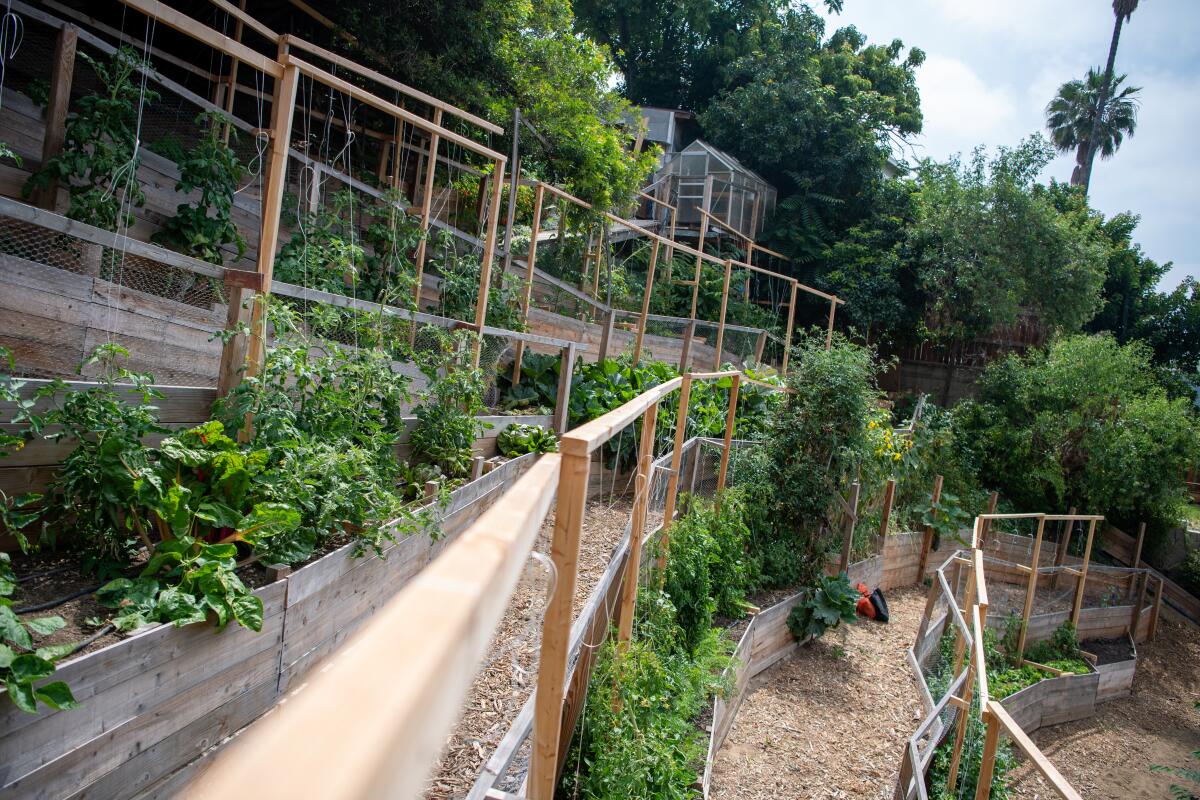
Inspired by the Mayan approach to terracing steep hillsides, Bassi and her father cut into the severely sloped bluff using hand tools. They started at the top, because it was easier to transport bags of concrete and 4-by-4 posts for the planting beds.
“It was very satisfying,” Bassi said.
During the day, the family worked on terracing the rows, building retaining walls and installing drip irrigation. At night, Bassi educated herself about urban farming by reading blogs like the Urban Farmer, Monty Don and Neversink Farm. She researched sustainable gardening practices by watching YouTube videos and consulting Reddit. When a friend recommended “zoo doo” — free compost made from yard clippings and L.A. Zoo animal manure — Bassi became a regular at the Griffith Park Composting Facility. Prompted by Conor Crickmore’s no-till farming practices, she created her own inexpensive soil by amending hillside dirt with compost, peat moss and “zoo doo.”
The once-ubiquitous ficus is making a comeback, helped in large part by millennials and the wellness movement.
After they cleared the hillside, Bassi and her father built one large raised bed out of untreated redwood fencing panels. Then another. Ultimately they built seven beds measuring 3 feet wide by 3 feet tall. They lined each bed with metal mesh to deter critters and sunk the posts into the ground as if they were building a retaining wall. They then attached the wood fencing panels to the posts.
For her first crop, Bassi planted 150 tomato plants in nine varieties. The tomatoes thrived on the south-facing slope, resulting in roughly 800 pounds of food.
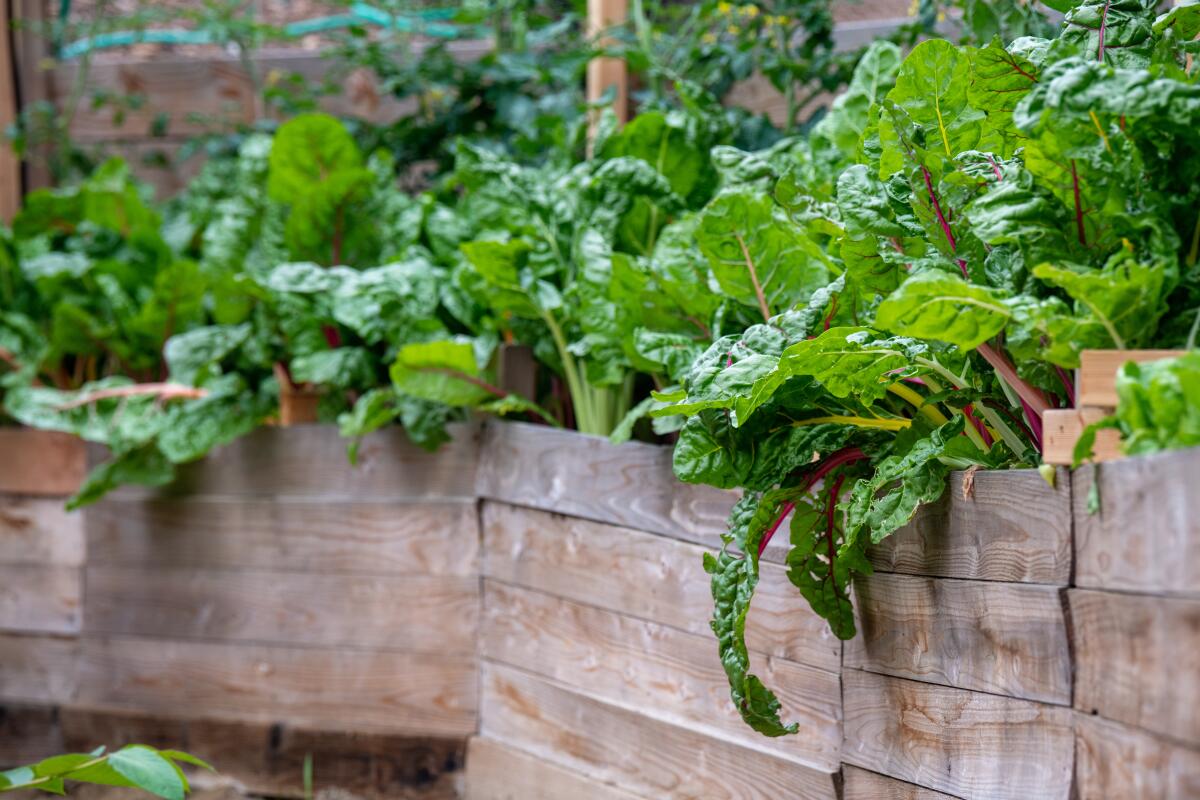
This year’s crop was equally productive, yielding 300 pounds of tomatoes (down from last year due to spring frost), 100 pounds of butter lettuce, 60 pounds of spinach, 100 pounds of Swiss chard and 20 pounds of carrots and beets. Bassi also grows about 20 pounds of microgreens a week along with lavender, thyme, sage, oregano, rosemary and chamomile.
Today, Bassi spends about eight hours a day on her hillside, which she calls Rose Hill Farm, and sells her organic produce at the Alhambra farmers market on Sundays. After cold-calling a few restaurants, she now provides her microgreens to chefs at Hippo in Highland Park and Pez Cantina in downtown Los Angeles.
Bassi still freelances in the entertainment industry but views the garden as a continuation of her work as a visual artist. “My artwork has to do with natural materials and degrading,” she said. “For me, it’s a natural progression into sustainable art.”
More to Read
Sign up for our L.A. Times Plants newsletter
At the start of each month, get a roundup of upcoming plant-related activities and events in Southern California, along with links to tips and articles you may have missed.
You may occasionally receive promotional content from the Los Angeles Times.
